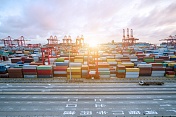A softening of China-Europe rail freight prices since Chinese New Year (CNY) has enabled Davies Turner to reduce the rates for its Express China rail freight service, a weekly fixed-day intermodal service it offers between China and the UK.
And as a result of new rail services being launched in China, the UK independent freight forwarding and logistics company is also resuming its full container load (FCL) service, which it said «has proven popular in the past», although the difficult market conditions last year — including rapid increases in costs in the last quarter, had made some China-Europe rail freight unviable in recent months.
Davies Turner launched its own direct weekly fixed-day rail consol import service from China to the UK in November 2018 and has seen it go from strength to strength, with bookings increasing «continually», the company said.
Tony Cole, Davies Turner’s head of ocean, commented: «Our weekly LCL volumes on the overland rail freight service have increased from just two High Cube 40-foot consol containers per week when we started the service in 2018 to six or seven per week now.»
The new rate of US$300 per 500 kg or 1 cubic metre will become applicable from mid-March and delivers a reduction of US$70 per 500 kg or 1 cubic metre on LCL shipments compared to the current rate, the company said, a reduction of almost one quarter.
Relative reliability of intermodal overland option
«The impact of the Covid-19 pandemic on air freight capacity and the well-documented, ongoing problems in the deepsea ocean freight market have seen more and more shippers, traders and co-loading freight forwarders taking advantage of the cost and time savings, as well as the greater reliability of our intermodal overland option,» Cole added.
On departure from Wuhan, China, the rail service heads direct to Duisburg in Germany. Containers are then trucked under bond to the nearby port of Rotterdam for transport by ferry to Purfleet, then on-carried by truck — still in the same container — to Davies Turner’s regional distribution centres across the UK, where they are discharged, customs cleared and delivered to final destination.
Cole concluded: «With a transit time of around 24 days from China to the UK, our direct weekly Express China Rail service for consol and FCL traffic continues to offer a reliable and much faster service versus the all-ocean alternative from ports on China’s North Eastern and Eastern coasts.»
Surge in demand
Lloyd’s Loading List reported last month that prohibitive air freight costs and soaring ocean spot freight rates — plus a lack of containers available for loading in China that have added to costs and transit time uncertainties — had led Asia-Europe shippers to switch to rail freight services in ever greater numbers ahead of Chinese New Year factory closures in February.
The surge this year builds upon strong and growing demand for Asia-Europe rail freight capacity that increased progressively last year and accelerated in the final quarter, as cargo owners and their logistics providers sought more reliable and stable alternatives to congestion, rollovers, and spiralling costs of ocean freight transport — which had eroded the normally substantial price differential between Asia-Europe ocean versus rail transport.
However, demand surged further in the first weeks of this year, despite strongly rising costs for the increasingly tight rail freight capacity, along with border delays on some routes creating backlogs and adding to supply chain logjams.




